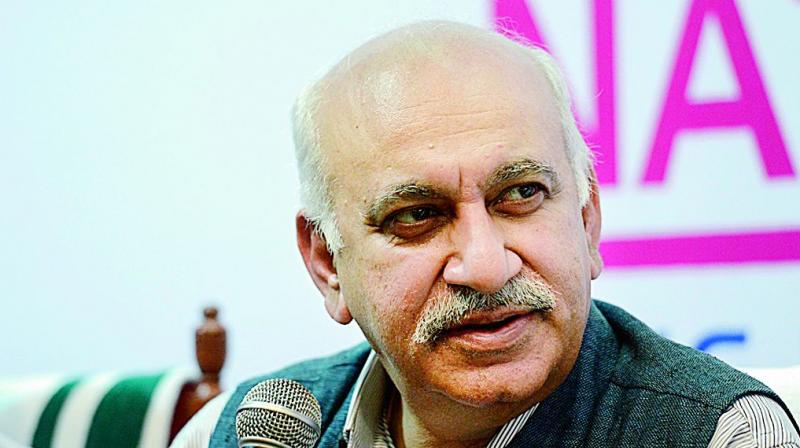MJ has betrayed those he influenced
The revelations about his assaults on young women mean that his reputation and all that he has stood for is in tatters for all time, and rightly.

About 25 years ago, I came from Surat to Bombay (as it was then called) looking for work. The family business of polyester manufacturing had collapsed. My educational qualification was that I had a diploma in textile technology. This came through a two-year course in operating machinery, after I had dropped out of school. Meaning I had no qualification for white-collar office work.
I tried to get a job in the import-export business and also the stock market (being qualified as a Gujarati), but there was nothing happening there at the time as the Harshad Mehta scam had just broken.
I was staying with a friend’s sister and her family in Vile Parle and spend the days looking for work from place to place. One day, on the local train, I noticed an advertisement for a job in a newspaper. To cut a fairly long and boring story short, I applied and discovered, to my shock, that I had got the job because journalism required no particular skill. Exactly 30 days later, that paper shut down but I was able to get another job in a newspaper, this time The Asian Age. The editor was M.J. Akbar, whom I had not known by reputation or fame, because Surat at that time did not have any English newspapers.
I worked in the Mumbai office (the name of the city was changed in that same period) of the paper from 1995 to 1998 and I must say it was a transformational experience. I had come from a background where women were not seen in the office space. The factories that my family ran, which were really small manufacturing units, did have a few female employees, but these were all labourers. In the language of the industry they were classified as “helpers” meaning that they carried some light cartons from here to there and cleaned up the spaces, but that was the extent of their participation. In the newspaper office where I had my first job, the women were equal participants. In fact, my boss was also a woman. This was an educational experience and one that all small town men should be forced to go through. I had to learn to change my view of women and that was a very good thing.
The second thing that was transformational was the exposure to individuals who were much smarter than I was and much better read than I was. It is hard to explain to someone who has been raised in a place like Delhi, Mumbai, Hyderabad or Kolkata, how limited the exposure of people from places like Surat is. This was especially true in that period before the Internet and before even there was much private television. Surat was not, and is not, a place that is particularly interested in learning and knowledge, unless it concerns making money. There was only one bookshop there 30 years ago that sold English books, and this was a city of about 15 lakh people or so.
So to be exposed to people of the same age as I — women and men — who knew and understood aspects of the world through learning rather than purely experience was for me a very significant thing.
None of these individuals was more influential than Akbar. My role was in Mumbai and he was based in Delhi and so the opportunity for interaction was not as much. But I was able to engage a little with his personality and a lot with his writing.
I was a conservative, highly nationalistic, fairly closed-minded Hindu man. Akbar was totally above religion in a way that I have not seen in another Indian individual. He was not defined by his faith but by his intellect and his outlook and his reading and writing. He redefined to many of us what Indian identity meant. He broadened it and he made it more liberal, more flexible and more attractive. It felt good to be Indian in this way. One did not have to hate Pakistan or China or other Indians to be able to take pride in one’s identity.
Those people whom he influenced deeply in this way, Akbar has let down (I would use the word betrayed) twice. He was always seen as opportunistic about his politics and his U-turn of recent years, which was accompanied by very un-Akbar chamchagiri, was disheartening. But one could laugh it off because a rogue in politics is nothing unusual. We could at least tell ourselves that the real individual was someone different than the one running after the chair.
However, these revelations about his assaults on young women mean that his reputation and all that he has stood for is in tatters for all time, and rightly. His credibility as a writer and a thinker is also diminished if not finished. I hope he is fired, rather than allowed to resign.
B09

